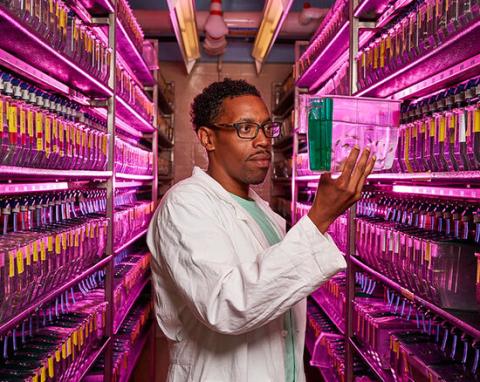
Credit: Ernesto del Aguila III, National Human Genome Research Institute, NIH
Today the NIH released two new funding opportunity announcements (FOAs) as part of the NIH Common Fund’s Faculty Institutional Recruitment for Sustainable Transformation (FIRST) program. The FIRST program, which was developed, in part, through the efforts and vision of the SWD office, and coordinated and co-chaired with NCI, NINDS, NIMHD and NHLBI, will fund institutions to recruit a diverse cohort of early-stage research faculty and prepare them to thrive as NIH-funded research investigators.
As we look forward to funding meritorious applications under the FIRST program, I want to provide some context into the concept of cohort hiring as well as the valuable insights gained from a similarly structured NIH intramural program.
Cohort Hiring and Inclusive Excellence
In higher education, faculty clustering/cohort hiring is the practice of enlisting faculty into multiple departments with a focus on interdisciplinary research topics or “clusters.” The practice was instituted by the University of Wisconsin-Madison in 1998 to foster collaborative research, education, and outreach for biomedical-related topics [1]. Because faculty cohort hiring approaches are focused across disciplines, they can transcend entrenched departmental hiring customs and barriers and instead focus on achieving results.
Cohort hiring approaches can enhance diversity among faculty in terms of scientific disciplines, but also demographics, socioeconomic status, and other criteria related to underrepresented groups. Enhancing diversity plays a critical role in establishing a culture of inclusive excellence, a stated goal of the FIRST program.
The goal of inclusive excellence is to establish and maintain a scientific environment that can benefit from the full range of talents available. In addition to enhancing diversity, achieving the goal of inclusive excellence also requires an inclusive institutional culture [2]. This can be nurtured with activities such as having diversity and inclusion baked into the core of all educational and professional programs, as well as establishing hallmarks of excellence.
Distinguished Scholars Program (DSP)
The Distinguished Scholars Program (DSP) represents a prominent NIH investment aimed at building an inclusive community within the NIH Intramural Research Program using a cohort hiring model.
In its early years, up to fifteen tenure track investigators a year are selected based on their research qualifications and demonstrated commitment to diversity and inclusion. In addition to getting four years of research support during their early tenure years, DSP investigators are provided professional development and mentoring in the context of their cohort. These activities are designed to foster career development while building a sense of community.
While the program is ongoing, preliminary data from the 2018-2020 DSP cohorts is promising. The 42 DSP scholars from these three years have research labs in 18 different ICs (out of 24 possible), ensuring that the effect of this program reaches across much of the intramural NIH. The intramural tenure-track investigators from underrepresented groups has spiked sharply since the launch of the program.
The promise we see in the DSP program has given us confidence that a similar approach can be expanded to the extramural research community.
Faculty Institutional Recruitment for Sustainable Transformation (FIRST)
With an estimated budget of $241 million over nine years, the Common Fund’s FIRST program will work to transform and maintain a culture of inclusive excellence in the biomedical research community.
The FIRST program will use a multipronged approach to accomplish its mission. Similar to the intramural DSP, FIRST funding will enable institutions to hire a diverse cohort of highly qualified, early-stage research faculty who are committed to diversity and inclusion. Approaches will also be supported at both the faculty and institution level. Faculty hired by the FIRST program awardees are intended to have access to mentorship, sponsorship, and networking opportunities. Institutional efforts may include faculty training and support for ensuring fairness in talent searches. These are changes that are likely to foster inclusive excellence.
To inspire such changes, the initiative takes the form of two grants: the FIRST Cohort FOA, which supports the faculty clusters at institutions, and the Coordination and Evaluation Center FOA, which allows for a comprehensive evaluation of the FIRST program.
Through support of the FIRST program, we will be able to see what the impact of cohort faculty hiring, individual faculty support, and transforming institutional practices has on creating a culture of inclusive excellence. Just as we are planning with the DSP program, we will carefully collect and analyze data from the FIRST program to help disseminate evidence-based strategies that work.
References
1. University of Wisconsin-Madison. Cluster Hiring Initiative. 2020; Available from: https://facstaff.provost.wisc.edu/cluster-hiring-initiative/.
2. Urban Universities for Health. Faculty Cluster Hiring: For Diversity and Institutional Climate. 2015; Available from: https://www.aamc.org/what-we-do/diversity-inclusion/urban-universities-health.

